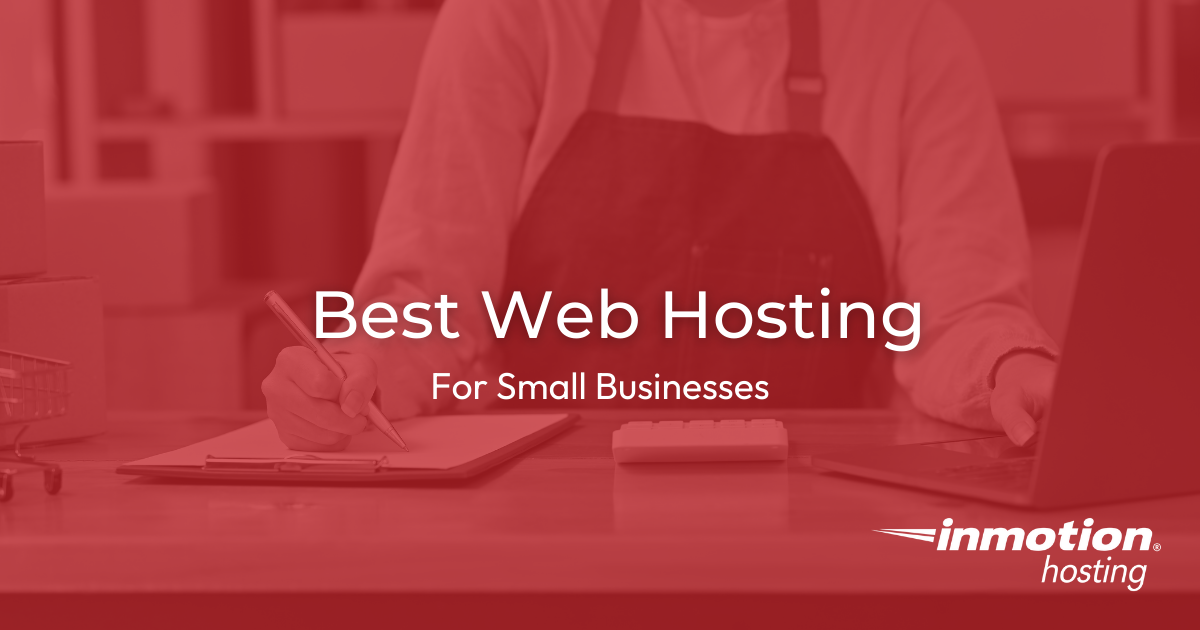
Best Web Hosting Options for Small Businesses
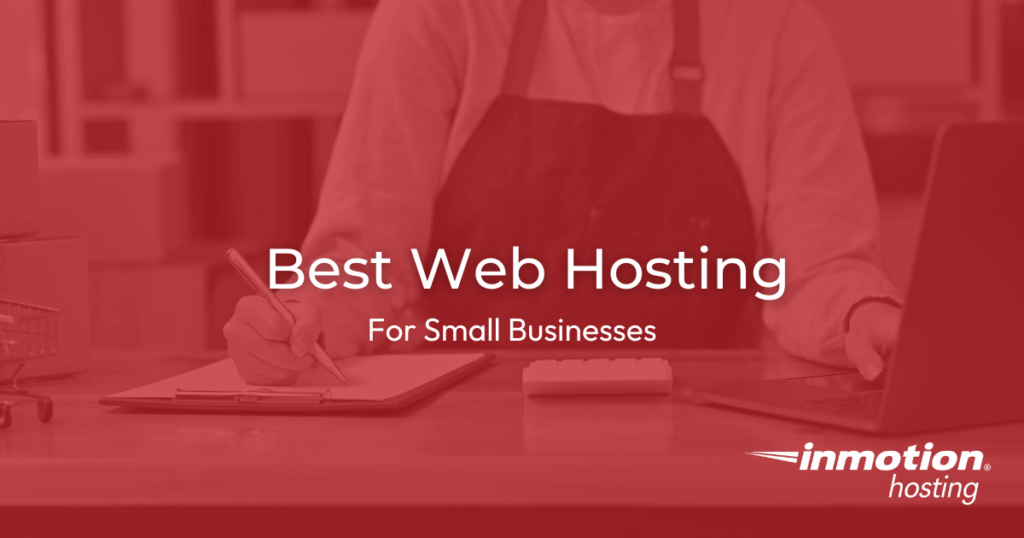
This guide reviews the best web hosting providers for small businesses, focusing on uptime, speed, security, and support. Discover top options tailored for startups, growing companies, and e-commerce sites, helping you pick reliable web hosting that boosts sales and protects your brand.
When your website is backed by reliable hosting, it does more than just stay online, it builds trust with your visitors and helps keep sales moving. You don’t need to sift through complicated technical terms or flashy marketing promises. The right hosting plan should make it simple for you to focus on your business goals.
At InMotion Hosting, we’ve helped thousands of business owners find hosting that balances performance, security, and ease of use. The essentials like fast page loads, strong uptime, and responsive support are what make the difference for a website that customers can count on.
Choosing the best hosting for your small business isn’t about picking the cheapest option. It’s about investing in a solution that delivers real value, keeps your site running smoothly, and grows with your needs.
This guide will walk you through what matters most when selecting a hosting plan. You’ll learn what to look for, how different options compare, and what other business owners have experienced. By the end, we hope you’ll have the confidence to choose hosting that supports both your site and your success.
Why Quality Hosting Matters for Small Business Success
There are many reasons that top hosting is essential in your foundation:
Profits
Your hosting quality affects your profits. It changes how well you keep customers and even where your site ranks in Google. If your website crashes, you lose money. Studies show that one hour offline costs small businesses about $7,900.
Performance
Website speed is just as important. Google’s research shows that if a page takes just one extra second to load, you could lose up to 20% of your customers. If you have 100 people ready to buy, slow hosting could turn away 20 of them. For a small business, this loss adds up fast.
Security
Security breaks can be even worse. If someone hacks your site or steals data, it can cost you about $200,000 on average. You have to pay to fix it and may lose your good name. Many small businesses never recover from a big hack like this.
Customer Trust
Slow or broken websites erode customer trust. They may leave, leave bad reviews, and pick a competitor instead. They often do not come back if you let them down.
Our Testing Methodology and Criteria
For this article, we didn’t take companies (including ourselves) at face-value. We reviewed all the services while thinking about what small businesses really need. Our checks include hosting services speed, performance, uptime promises, customer service, and more.
Best Hosting for Small Business: Top 5 Providers
1. InMotion Hosting: Best Overall for Small Business
InMotion Hosting stands apart by putting business success first. Unlike generic hosting providers, every feature is designed specifically for business owners who can’t afford downtime, slow speeds, or unhelpful support when problems arise.
What Makes InMotion Different:
Real Human Support When It Matters Most: When your website goes down at 2 AM, you won’t get a chatbot or overseas call center. InMotion provides 24/7 access to U.S.-based support teams who understand business-critical issues. Our migration specialists handle your entire website move for free, ensuring zero downtime during the transition. Over 10,000 agencies and professionals trust InMotion because they know real experts will answer when they call.
NVMe SSD Storage as Standard: While competitors charge extra for fast storage, InMotion includes lightning-fast NVMe SSD drives on every plan. Your product images load instantly, checkout pages respond immediately, and customers never wait. This isn’t just about technical specs—it’s about preventing lost sales from impatient shoppers.
Growth Without Limits: InMotion’s Cloud VPS and dedicated hosting solutions scale seamlessly with your business. You won’t hit arbitrary resource limits or face surprise upgrade fees. When your Black Friday traffic spikes or your marketing campaign goes viral, your site stays online and performs flawlessly.
Ironclad Uptime Guarantee: If your website isn’t available 99.9% of the time, InMotion credits up to 50% of your monthly hosting fee. This isn’t just a promise—it’s a business partnership where your success determines ours.
Business-Grade Security Included: Free SSL certificates, malware scanning, DDoS protection, and daily backups come standard. These aren’t add-ons that inflate your bill—they’re essential protections for any serious business.
Pricing starts at $6.99 per month for shared hosting with business-grade features that typically cost extra elsewhere. The investment pays for itself through prevented downtime, faster customer conversions, and peace of mind.
Minor considerations: InMotion costs more than budget providers, but this reflects the business-focused infrastructure and support that generic hosts simply can’t match.

2. SiteGround: Best for Customer Service
SiteGround excels at customer support with live chat response times typically under 30 seconds—the fastest we’ve tested. Their support team understands common business challenges and provides real solutions for WordPress, Joomla, and custom applications.
Customer support operates 24/7, fitting the schedules of small business owners who often work evenings and weekends. Their comprehensive knowledge base enables you to solve minor issues independently while leaving complex problems to their expert staff.
Drawbacks: Pricing increases significantly after the first term, and entry-level plans have resource limitations that could restrict fast-growing businesses. Plans cost more than budget alternatives, but the superior support justifies the premium for businesses requiring frequent assistance.
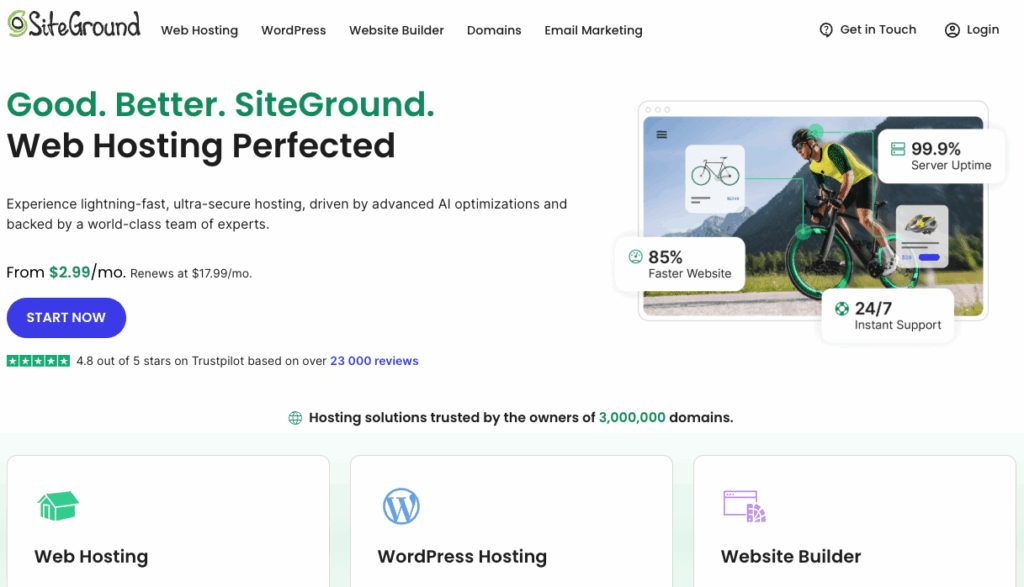
3. Bluehost: Best for WordPress Integration
Bluehost specializes in WordPress hosting with automatic updates and security patches, allowing you to focus on business instead of technical maintenance. The platform handles WordPress core updates, themes, and plugins automatically, protecting against security vulnerabilities from outdated software.
Integration with popular business plugins and WooCommerce runs smoothly, minimizing technical complications. Online stores benefit from WordPress-optimized performance that keeps checkout processes fast and reliable.
Limitations: Support can slow during peak hours, and some users report aggressive upselling of additional features. Plans start at $7.99 per month for WordPress hosting.
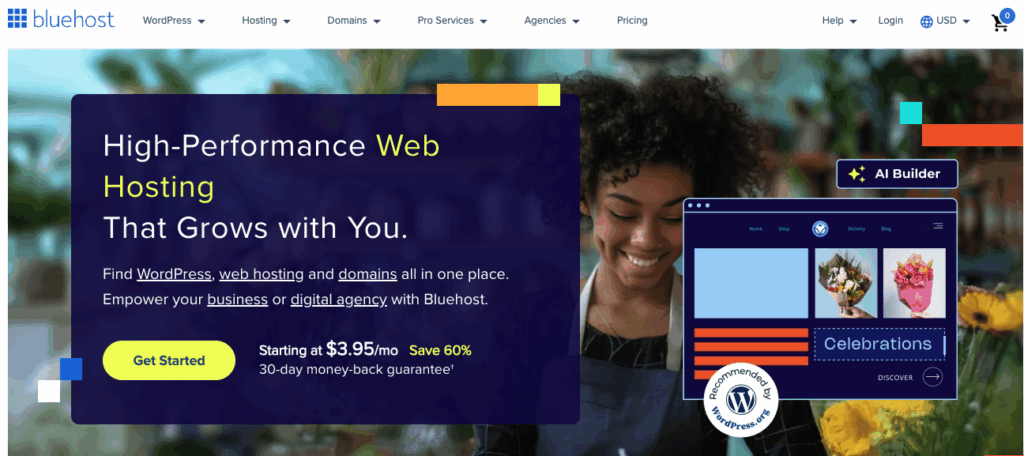
4. HostGator: Best Budget Option
HostGator appeals to startups seeking low initial costs, but renewal prices often double or triple after the first term. Performance lags behind premium providers, and customer support quality varies with longer wait times during business hours.
Drawbacks: HostGator works as an entry point for startups that don’t rely heavily on their website, but businesses requiring consistent online presence should consider premium hosting from day one.
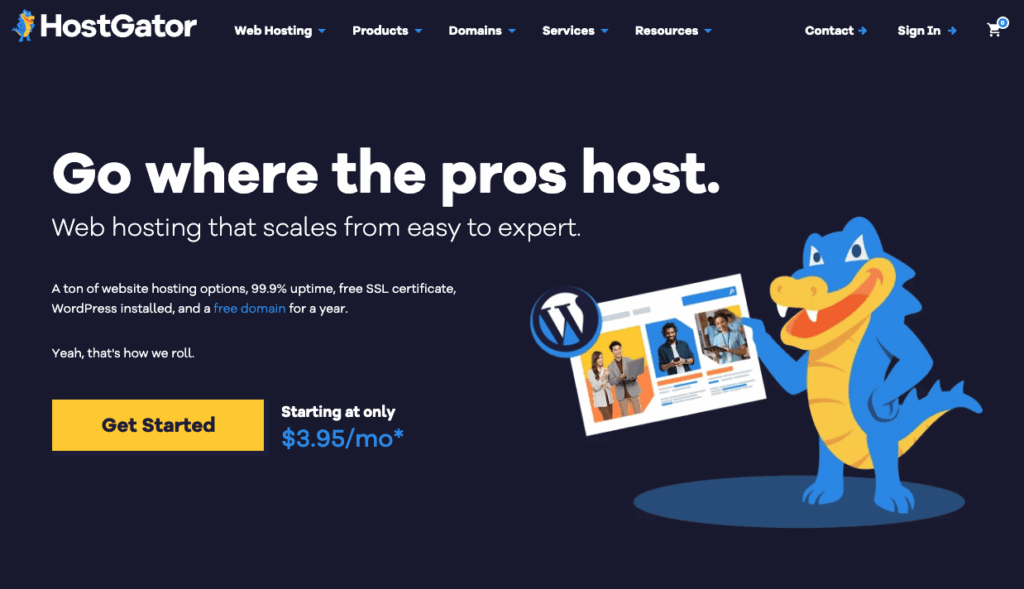
5. A2 Hosting: Best for Speed
A2 Hosting’s Turbo servers deliver website loads under 350 milliseconds—the fastest we tested. Global data centers ensure quick loading for international customers, and developer-friendly features support custom business solutions.
Support staff understand business requirements and provide helpful solutions beyond basic troubleshooting.
Cost consideration: Turbo plans command premium pricing, and entry-level plans don’t deliver maximum speed benefits. Plans start around $9.99 per month.

Types of Hosting Solutions for Small Businesses
The right type of hosting depends on your business size and needs. Startups often want something cheap and easy. Bigger companies need more resources and features.
Shared Hosting
Shared hosting is best for startups and small local businesses. It is affordable and simple. With shared hosting, many websites share the same server. This keeps prices low, making it good if you do not have many visitors yet.
But shared hosting has limits. If other websites use up too many resources, your site slows down. This makes a bad experience for your visitors, especially during busy times. If another website on your server is hacked or gets very busy, your site can have problems too.
It’s probably time to upgrade when your pages start loading slowly. Watch for more visitors than usual or more people buying things. These signs mean you might have outgrown shared hosting.
InMotion’s shared hosting is different. They focus on business speed and offer a stronger uptime promise, so your business can grow before you need to upgrade.
VPS Hosting
VPS (virtual private server) hosting is better for growing businesses or online stores. You get your own part of the server, so other websites will not affect your speed. Customers get a consistent experience, and your site stays fast even if other businesses on the server get busy.
VPS hosting is scalable. You will be ready for traffic surges, like during sales or big events, and stay online. Your customers will not get frustrated by slowdowns during Black Friday or holiday sales.
You also get more control. You can add your own software or make special changes. But with that control, you might also need more tech skills. Many hosts offer managed VPS plans, which means experts will help keep things running if you do not have an IT team.
Fast storage like NVMe SSD (a type of very fast drive) makes a real difference. Websites, pictures, and shopping carts load quicker. This helps keep your customers happy when buying from you.
Dedicated Hosting
Dedicated server hosting is for bigger businesses with lots of traffic. You get your own server that no one else shares. This means the fastest performance and the most control. No other websites can slow yours down.
Dedicated hosting is also safer. Your server is on its own, so it is better for protecting private customer information like credit cards. If you need to follow strict rules for payments, this keeps you covered.
With your own server, your business tools and websites run at full speed. You get all the speed and memory for yourself. This is better for both your customers’ experience and your own company tools.
Dedicated hosting can be less expensive than buying and maintaining your own servers. You do not have to buy hardware or pay IT staff to look after it all the time.
Specialized Small Business Hosting Needs
E-commerce Hosting Considerations
If you run an online shop, you need more than the basics from your hosting. Keeping payments safe is very important. Look for PCI (payment card industry) security standards. These are required for any site that takes credit cards.
You must also have SSL (security certificates). These protect customer data during every sale. Buyers look for a padlock icon on your website. Most good hosting companies give you a free SSL so your shop appears trustworthy.
Slow hosting can cost you sales. Every extra second in checkout can make more customers leave without buying. Fast hosting helps prevent this. You also need daily backups. They keep your orders, payment data, and customer info safe if anything goes wrong. If your site breaks, daily backups help you get back online fast without losing business.
Some hosts, like InMotion’s WooCommerce Hosting, build their service just for online stores. They make sure your product pages open fast and that transactions are secure and smooth. This helps you sell more and keeps your shop safe.
It is also important to check that your hosting works with big payment options like PayPal, Stripe, and Square. If your payment gateway does not work, you risk losing sales. Even if your website is working otherwise.
Good hosts also include virus scanning and tools to block attacks (like DDoS protection). These features help keep hackers and scammers away, protecting your store and your customers from harm.
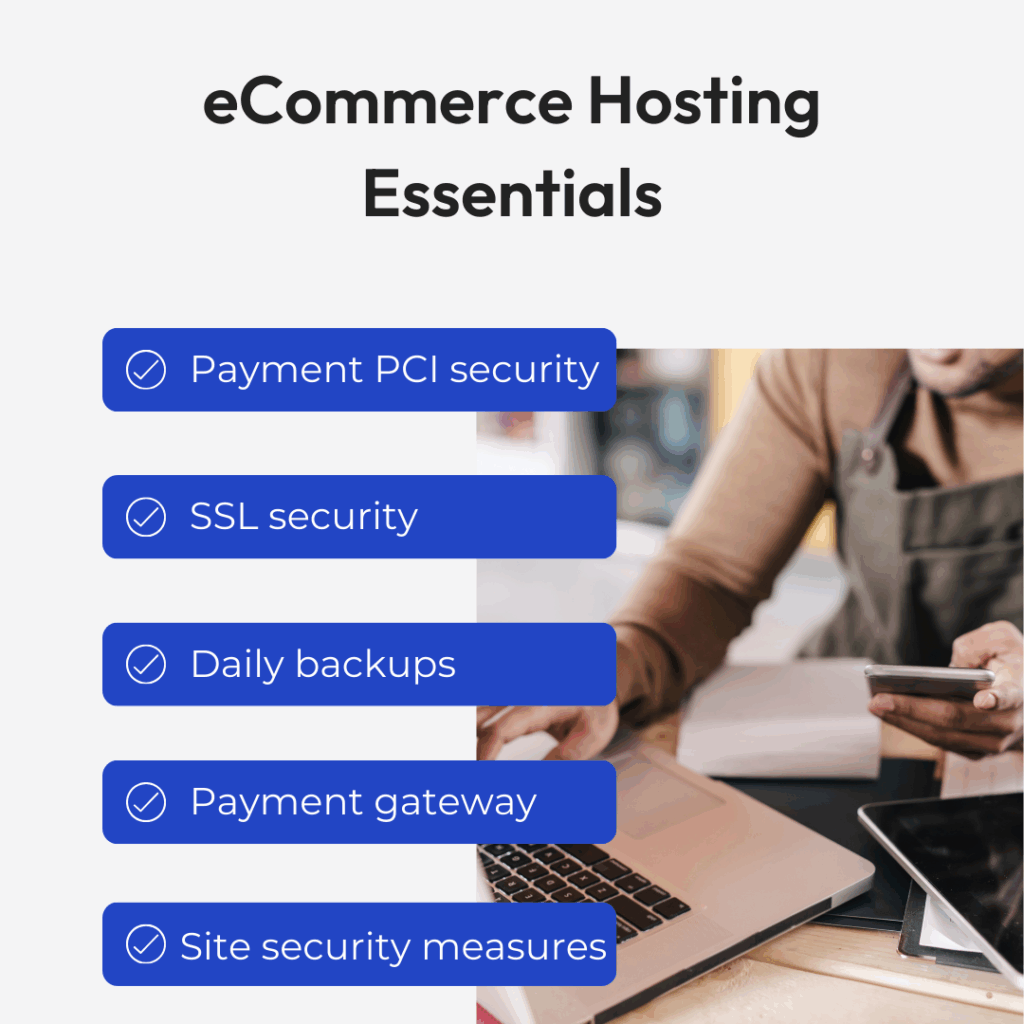
Service-Based Business Hosting
If your business relies on customers contacting you, your website hosting needs to keep all forms and contact tools working all the time. When website forms break, you lose chances to get new clients.
Email is also vital. Connection or delivery problems from poor hosting damage trust with clients. It’s important your professional email always works.
Many service businesses use appointment scheduling tools, like Calendly or Acuity. These tools rely on your website’s hosting. If your hosting is not stable, you might miss new appointments, leading to lost customers.
Local SEO is another point. If you serve clients in your town or city, a hosting provider with servers nearby makes your website load faster for local customers. Search engines see this as a plus, helping you show up higher in local search results.
Making the Switch: Migration Considerations
Moving your website to a new hosting provider takes planning. Keeping your business online is the top goal during the move. Even short downtime can cost sales or damage customer trust.
Make sure you have a checklist before moving:
- Make a complete backup of all website files and databases, so nothing is lost.
- List every email account and setting you will need to move.
- Write down your website’s address settings (DNS) in case you need them later.
- Note which third-party tools might need changes after you move (like booking apps or payment links).
Try moving your website during quiet hours. Nights or weekends usually have fewer visitors. This limits the number of people affected if there is a short problem during the move.
After the move, check everything before you go live. Make sure forms, payment pages, online searches, and mobile features all work. Testing helps you catch surprises before customers notice them.
Email is extra important. Set up new email accounts and test them before you move the website for good. Lost emails can mean missed deals or unhappy clients.
Need hassle-free hosting with expert support? Find your perfect small business web host with InMotion Hosting and get started easily.
Choosing the Best Hosting for Your Small Business
Quality hosting helps you earn more, keeps customers happy, and makes your website easier to find. A good provider will grow with your business and protect your site from problems.
Pick your hosting based on your business:
- Think about current website traffic and how fast you expect to grow.
- Decide if you need lots of tech support or want simple tools.
- Consider your budget and which features you cannot live without.
- Include extras like online stores, booking tools, or special email needs.
Choosing the right hosting now saves you from trouble later. The best hosting for a small business gives you a strong foundation to grow and keeps you safe online. Base your decision on long-term value, not just the lowest price.
Ready to make your small business shine online? Pick a hosting plan today that will keep your site up, secure, and ready for growth.







